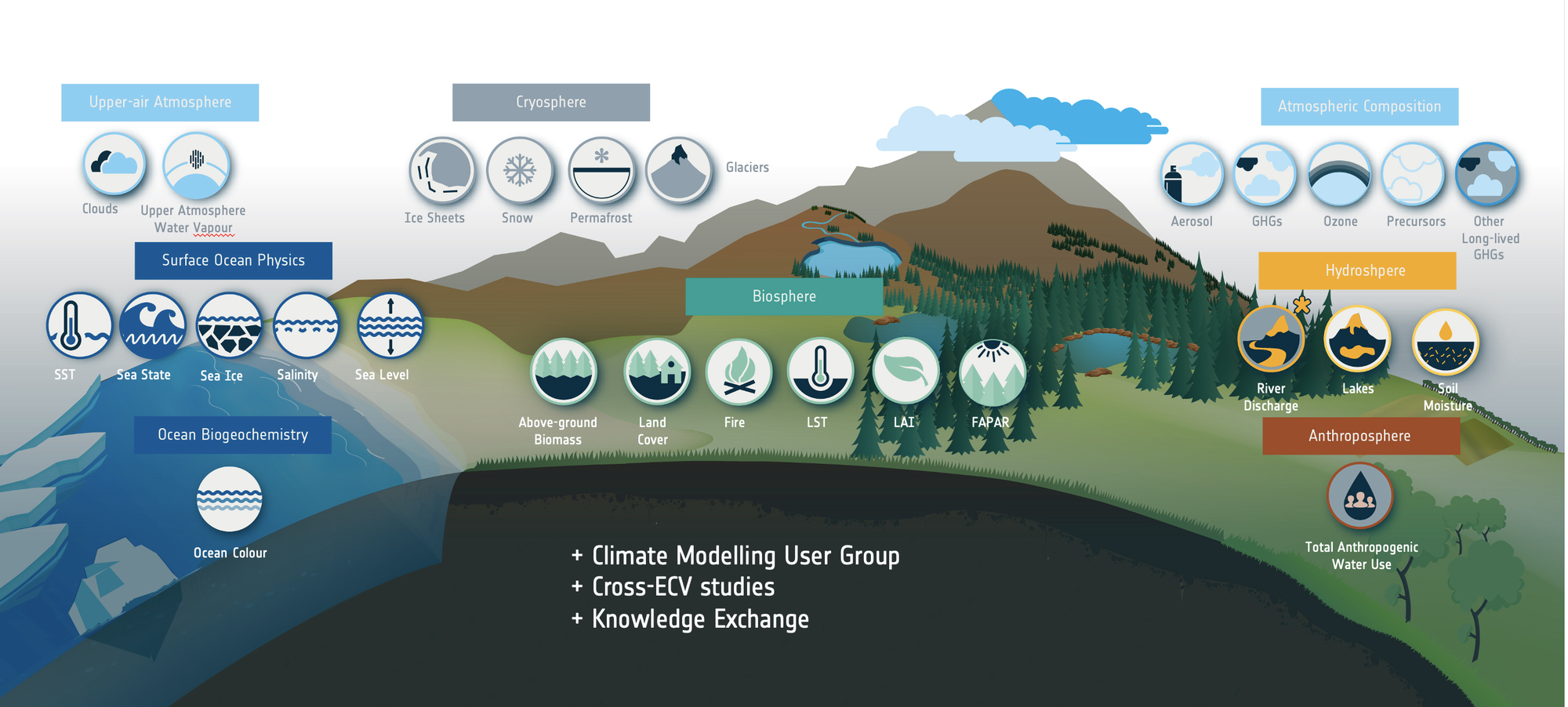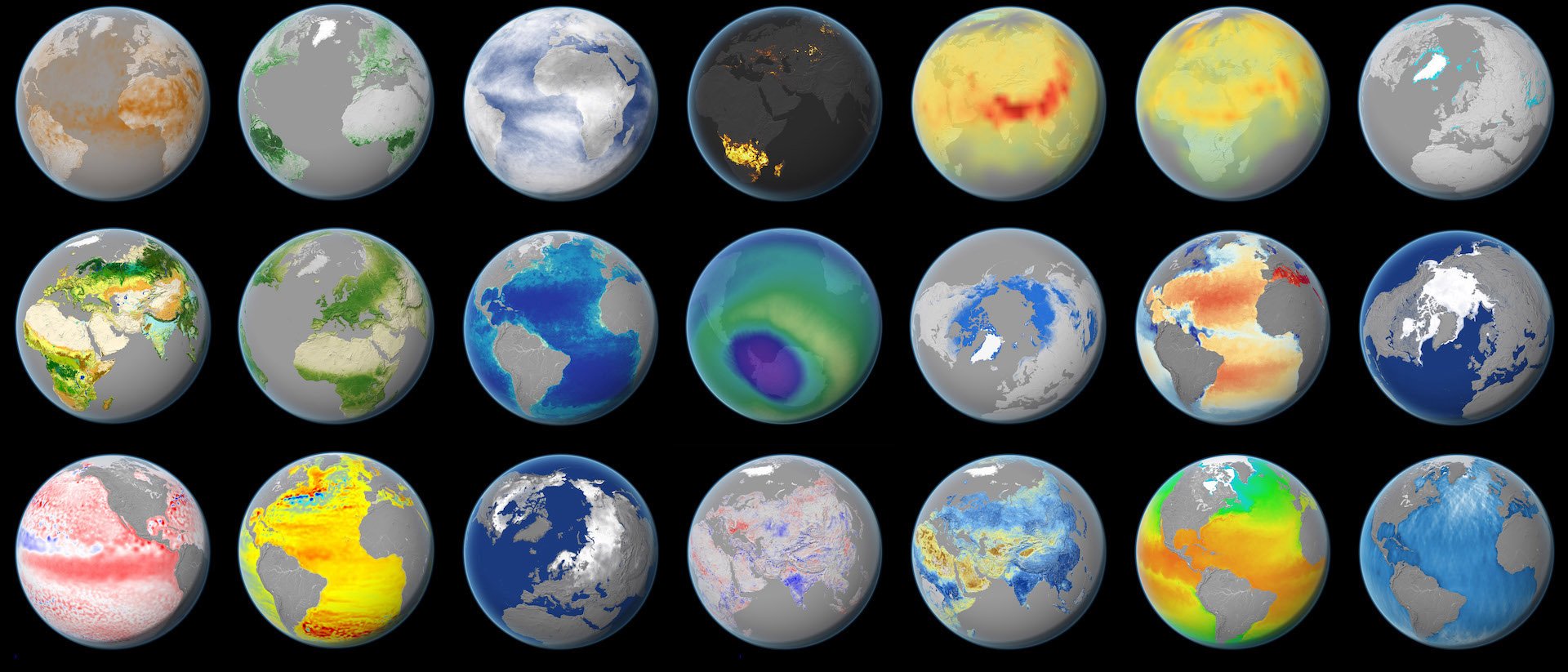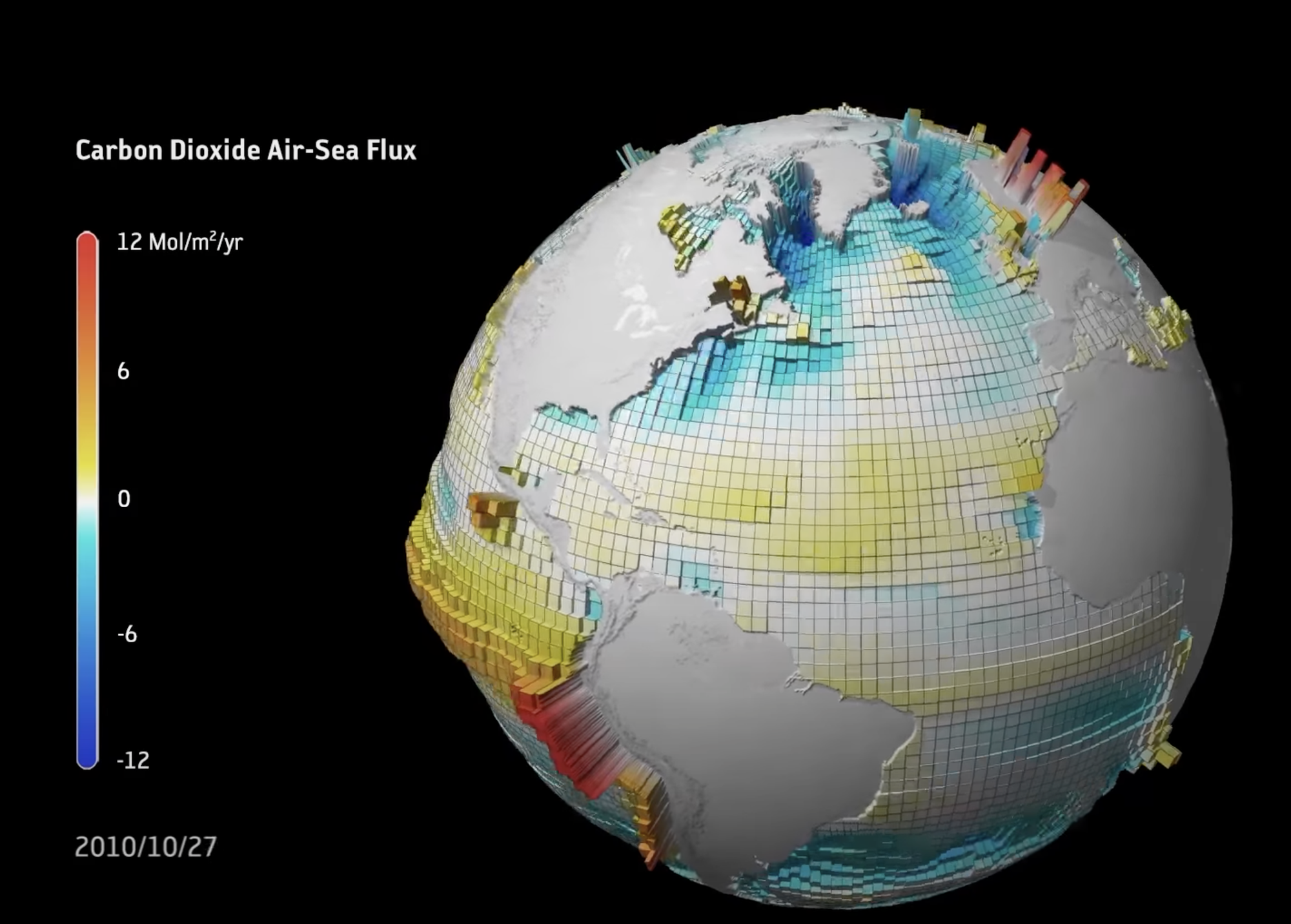Overview of the Climate Change Initiative
The objective of the ESA Climate Change Initiative
Established by ESA in 2008, the Climate Change Initiative is a major R&D effort focused on developing global, decades-long satellite-derived climate data records. Collectively, these data provide a major contribution to the Intergovernmental Panel on Climate Change assessment of the state of the climate and underpin the climate value information chain (monitoring, modelling, climate services) that inform effective policy, decision-making and action.
From 2023-2029 the Programme is addressing evolving requirements for Earth Observation to support the UNFCCC Paris Agreement and address country-scale and regional requirements as formulated in their Nationally Determined Contributions (NDCs) and National Adaptation Plans (NAPs).
Supporting the Global Climate Observation system
Using observations from the 40-year satellite archive and current ESA missions, the Copernicus Sentinels and ESA third-party missions the CCI generates datasets for key components of the climate – known as essential climate variables.
Defined by Global Climate Observing System (GCOS), Essential Climate Variables (ECVs) represent the information required by the United Nations Framework Convention on Climate Change to systematically monitor the Earth system.
Satellite observations form the backbone of GCOS. Of the 55 Essential Climate Variables required to characterise the climate system, climate data records for two-thirds (38) are exclusively or largely measured from Space. The contribution of the CCI is significant, records that addressing 27 Essential Climate Variables (as of January 2024).
Climate Change Initiative project portfolio
The CCI comprises a suite of projects dedicated to generating data products to address individual Essential Climate Variables; a Climate Modelling User Group to ensure data product consistency and suitability from a user perspective; various cross-ECV research studies that exploit these data products to tackle complex climate science questions; and a knowledge exchange project to facilitate easy and open data access and use.

ECV projects: pre-operational satellite CDR R&D
Drawing on a 500-strong community of world-leading scientists and data engineers across Europe research teams perform R&D to produce and qualify of high-quality satellite-derived data records for Essential Climate Variables.
To develop these pre-operational data records and processing systems each project undertakes the following activities
- product specification
- algorithm development and improvement, enbling sustainable integration of existing and new mission data
- large-scale data processing
- uncertainty characterisation
- product generation
- pre-operational system definition, sizing and demonstration
Transfer to operational environments
Once sufficiently mature, it is an explicit aim of the CCI to transfer these prototypes products to operational climate services outside of ESA, such as EUMETSAT and the Copernicus Climate Change Service (C3S), where they are maintained and extended temporally.
On-going R&D is provided by the CCI in response to the evolving requirements of climate services. To date 26 ECV datasets and processing systems and algorithms developed using CCI R&D have been adopted and trasnferred to an operational environment.


Research quality climate data
All CCI data products are robust and high quality, take GCOS-definitions for Essential Climate Variables as reference and are developed based on the best available science. They offer the latest (pre-operational) algorithm updates and are validated using independent in-situ measurements. The records are robust with high levels of documented traceability and consistency, including quantitative estimates of uncertainty and are evaluated by leading members of the climate science prior to release.
A Climate Modelling User Group also works with all projects to ensure data products are suitable from a modelling user perspective.
Full documentation is available for each ECV project.
CCI data product features include:
- Global coverage (where applicable)
- Long time series (20-30 years)
- Gridded data (at a usable resolution e.g. ¼ degree)
- Useful temporal resolution (daily, monthly…)
- Latest algorithm improvements towards GCOS requirements
- Bias corrected (e.g. across multiple satellites)
- Validated (by in situ observations) & tested by users
- Uncertainty characterisation (per pixel, correlated…)
- Full documentation (CCI documentation) & version control
- Consistency between CCI ECV datasets (e.g. SST and Sea Ice)
- Can be sourced back to algorithm choice
- Level 1, 2 or 3 data
- Supporting information e.g. cloud masks
- Open access data via CCI Open Data Portal & Obs4MIPS
Extending and expanding ECVs
The CCI undertakes ongoing R&D for all existing ECVs. This is paramount to derive full benefit from ESA and Member States’ Earth observation infrastructure and includes integration of new missions and instruments; continually improve uncertainty characterisation and ensure cross-ECV consistency. ECV development also continues to address new user requirements from GCOS implementation plans, the IPCC sixth assessment report gap analysis etc).
The CCI will address additional ECVs between 2023-2029, in response to evolving requirements from GCOS, the IPCC and operational climate services, particularly where this supports the developing road map towards UNFCCC Paris Agreement reporting and systematic forcing data sets for CMIP-7.
Cross-ECV studies: exploitation of CCI datasets
To further understand Earth system cycles, including future trends and impacts of change and how it relates to the climate sensitivity of the Earth System and tipping points the CCI undertakes a number of cross-ECV studies, which draw on multiple CCI CDRs for relevant ECVs.
Current and recent projects include:
- Using land and atmosphere ECVs to observe GHG observations in a consistent way to support carbon cycle understanding such as the RECCAP-2 project
- Budget closure activities have promoted the importance of product consistency between projects. Current examples include the Sea Level Budget Closure and Ice Sheet Mass Balance Intercomparison Exercise projects
- Arctic Methane and Permafrost Challenge, a transatlantic initiative to constrain methane flux estimates from Arctic permafrost
- Taking a cycles approach has helped to better consider the gaps in data needs: e.g. root zone soil moisture, river discharge and total anthropogenic water use
New cross-ECV exploitation activities will be undertaken on specific topics that directly respond to identified scientific needs or provide direct relevance to the IPCC assessments.
Linking climate observations and modelling
Earth observations are critical value for enhancing the quality, credibility and value of model predictions. They provide the empirical record from which to validate and reduce uncertainty in climate models and their projections and support the provision of more reliable information for policy and decision-makers.
CCI products are suitable for use by the modelling community, an activity led by the CCI a Climate Modelling User Group.
Several CCI products are available in a format relevant to model output requirements of the WCRP's Coupled Model Intercomparison Project (CMIP) to support enable model evaluation, development and research.
These model-ready observational datasets corresponds to a biogeophysical field that is output by a climate model in one or more of the CMIP experiments such as thethe Arctic Ocean Model Intercomparison Project (AOMIP), which used CCI data to predict the future pattern of sea ice loss in the CMIP 6 experiment. These data are available on the Earth System Grid Federation(ESGF) with the archive of CMIP model output data.
From 2023-2029, the CCI will work to further strengthen the use of EO data for climate modelling, in particular activities will:
- Actively link to international initiatives such as WCRP’s ESMO, CMIP, CORDEX and Lighthouse Activities etc,
- Contribute to the ESMValTool – a tool that compares and benchmarks Earth System Models against observations.
- Support the WCRP CMIP-International Project Office, hosted by the Climate Office.
Knowledge Exchange and outreach
To raise awareness, increase access and facilitate use of CCI data products, the CCI also includes a Knowledge Exchange project. This provides:
- ESA climate data centre - free and open access data portal for all CCI ECV products
- CCI Toolbox – allowing manipulation, analysis and visualization of CCI (and third party) data products
- Climate from Space web application – an online viewer for layperson audiences based on an interactive globe to view CCI datasets
CCI Fellowship scheme
The CCI offers post-doctoral research fellowship schemes aims to support early-career scientists and engineers, from eligible ESA Member States to advance and/or demonstrate the value of ESA Earth observation missions and satellite-derived climate data records that address Essential Climate Variables addressed by the CCI..
To date (as of January 2024) the CCI has funded over 30 research fellowships.
Upcoming calls will pay particular focus on making the link to the climate modelling community.
[more LINK fellowships]



